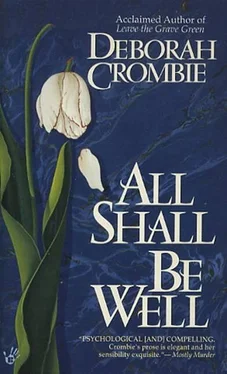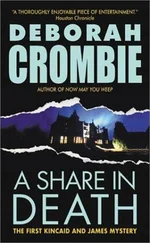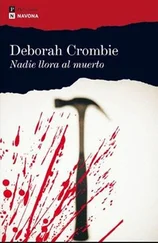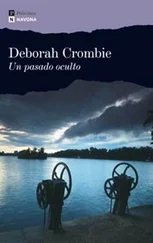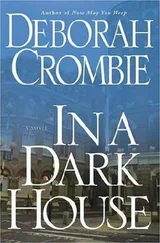Deborah Crombie - All Shall Be Well
Здесь есть возможность читать онлайн «Deborah Crombie - All Shall Be Well» весь текст электронной книги совершенно бесплатно (целиком полную версию без сокращений). В некоторых случаях можно слушать аудио, скачать через торрент в формате fb2 и присутствует краткое содержание. Жанр: Триллер, на английском языке. Описание произведения, (предисловие) а так же отзывы посетителей доступны на портале библиотеки ЛибКат.
- Название:All Shall Be Well
- Автор:
- Жанр:
- Год:неизвестен
- ISBN:нет данных
- Рейтинг книги:3 / 5. Голосов: 1
-
Избранное:Добавить в избранное
- Отзывы:
-
Ваша оценка:
- 60
- 1
- 2
- 3
- 4
- 5
All Shall Be Well: краткое содержание, описание и аннотация
Предлагаем к чтению аннотацию, описание, краткое содержание или предисловие (зависит от того, что написал сам автор книги «All Shall Be Well»). Если вы не нашли необходимую информацию о книге — напишите в комментариях, мы постараемся отыскать её.
All Shall Be Well — читать онлайн бесплатно полную книгу (весь текст) целиком
Ниже представлен текст книги, разбитый по страницам. Система сохранения места последней прочитанной страницы, позволяет с удобством читать онлайн бесплатно книгу «All Shall Be Well», без необходимости каждый раз заново искать на чём Вы остановились. Поставьте закладку, и сможете в любой момент перейти на страницу, на которой закончили чтение.
Интервал:
Закладка:
He started walking again, head down into the wind, beginning the long climb to the Heath-top. Somehow, in the course of the weekend, the atmosphere between them had shifted. Today they'd worked together in their usual way, and he'd begun to think he was imagining things, but then he sensed her uncharacteristic hesitation when he suggested they stop for an after-work drink. They often did that, talking over the day's progress and planning the next, and only now did he realize how much he looked forward to it. Maybe he demanded too much of her time, and she resented it. He'd be more careful in the future.
Twigs of gorse, heavy with yellow blossom, scratched and snagged at his sleeve as he absentmindedly passed too near. Beautiful and irritatingly prickly, like Gemma-and like Gemma, it needed to be handled with caution. He smiled.
His path dead-ended at the top of Heath Street, just across from Jack Straw's Castle. The parking lot of the old pub was already full, and when the door swung open the wind carried a faint drift of music to Kincaid's ears. The boisterous crowd didn't appeal to him and he turned left down Heath Street, feeling the pull in his calf muscles as he made the steep descent. When he reached the tube station, an impulse sent him straight ahead rather than left into Hampstead High Street. Church Row came up shortly on his right, and he turned into the narrow lane, the spire of St. John's leading him on like a compass needle.
Kincaid entered the churchyard through the massive wrought-iron gates. A drunk snored on a bench by the church door, disturbing the silence. Kincaid turned left, into the dim greenness of the tomb-covered hillside, which even in early spring was tangled and overgrown with vegetation. The path wound under the heavy boughs of evergreens, passing damp, gray stone slabs, splotched with lichens. He stopped at his favorite spot, just before the lower boundary wall.
"John Constable, Esq., R.A., 1837," read the carved inscription on the side of the tomb. Constable lay with his wife, Mary Elizabeth, and the marker also bore witness to the death of their son, John Charles, age twenty-three. Constable's name was associated with the history of almost every part of Hampstead, as he rented one house after another from 1819 until his death, and was said to have asked to "take his everlasting rest" in the village he immortalized in his paintings.
Why Kincaid found the Victorian monument comforting he couldn't have said, but since he'd lived in Hampstead he had developed a habit of coming here to think when he couldn't quite sort something out. He sat on a rock and rubbed a twig between his fingers, crumbling the dry bark to dust. Frowning, he tried to clear his mind, concentrate. His gut-instinct told him that Meg really had loved Jasmine, would not have harmed her against her wishes. Roger, however, was a different kettle of fish, and a smelly one at that. Sex was a powerful and often twisted force, and he wasn't sure how blind an eye Meg might have persuaded herself to turn in order to preserve her relationship with Roger.
And Theo? Had Theo resented his sister more than he loved her? He certainly had reason to be grateful to her, but the contrariness of human nature could make gratitude a difficult burden to bear.
He began to see Jasmine sitting in the center of a radiating web of relationships, inviolate. What had she felt for anyone? Had she moved through her life untouched and untouching? She'd faced her illness with such equanimity. He couldn't reconcile the passionate girl in the journals with the woman he'd known-charming, witty, intelligent, and more guarded than he ever had imagined.
Kincaid sighed and stood up. The light was fast fading, the graves had no secrets to impart, and if he weren't careful he'd be blundering his way back up the hill. He realized that the wind had died, and beyond the boundary hedge the lights of the city glowed in the gathering dusk.
The drunk was gone when Kincaid reached the church again. From within the building, muffled by the heavy doors, voices sang in familiar cadence. "Evensong," Kincaid said aloud. When had he last heard an Evensong service? The sound took him back to the sturdy red-brick church of his Cheshire childhood. His parents had deemed the Evensong service the only compromise between their Anglican upbringing and their liberal philosophies, and while the family often attended Evensong, Kincaid could not remember being inside the church on a Sunday.
Inching open the scuffed, blue-leather-padded door and slipping through, Kincaid made his way to the last pew and eased into it. Only a few scattered forms filled the seats in front of him. He wondered that the service, so lightly attended, was held at all.
Voices rose, the sound filling the hollow space inside the church, and the notes of the massive organ vibrated through the pew into his bones. Kincaid relaxed, idly watching the choir director. The man used his hands like blunt instruments, chopping and jabbing his signals to the choir. He looked, in fact, more like a rugby forward than a choir director-well over six-feet tall, with massive shoulders under his surplice and a square, heavy-jawed head.
The director moved a step to the right and Kincaid caught a glimpse of a familiar face in the choir's back row. A fringe of gray hair around a balding head and a ruddy face, a clipped gray mustache-so accustomed was Kincaid to the Major's usual tweedy attire that the full, white fabric of the surplice had disoriented him for a moment. How could he have forgotten the Major telling him he sang with the St. John's choir? Kincaid watched, fascinated by the sight of his taciturn neighbor raising his voice in a joyous, open-mouthed bass.
The service drew to a close. The final "amen" hung trembling, then the choir filed out. The other congregants passed Kincaid on their way to the door, smiling and glancing curiously at him. Regulars, he thought, wondering just who the hell he was. When the porch door closed on the last straggler, Kincaid stood and walked toward the altar.
"Excuse me."
The director had his hand on a door which Kincaid thought must lead to the vestry. He swung around, startled, his movements surprisingly graceful for such a large man. "Yes?"
"Could I speak to you for a minute? My name's Duncan Kincaid." Kincaid thought fast. He didn't want to make a professional inquiry of a friend and neighbor just yet, only set his own mind at ease. Perhaps his jeans, anorak, and wind-blown hair weren't a disadvantage after all.
Hand outstretched, the choir director came toward Kincaid. "I'm Paul Grisham. What can I do for you?"
Kincaid heard in his voice a familiar lilt. "You're Welsh," he said, making it a statement. Paul Grisham's face broke into a grin, showing large, crooked teeth. His nose, Kincaid saw, had been broken, and probably more than once.
"That I am. From Llangynog." Grisham cocked his head, studying Kincaid. "And you?"
"A near neighbor, across the border. I grew up in Nantwich."
"Thought you didn't sound London born and bred."
"You play rugby?" Kincaid touched a finger to his own nose.
"I did, yes, when my bones knitted quicker. Wrexham Union."
Kincaid shifted a bit and leaned against the altar rail. He sensed Grisham waiting for him to get to the point, and said casually, "I just happened by, quite by accident. I'd no idea you had Evensong service." He nodded his head toward the choir stall behind Grisham. "Was that Major Keith I saw?"
Grisham smiled. "You know the Major? One of our mainstays, he is, though you wouldn't think it to look at him, the crusty old devil. Regular as clockwork, never misses a practice."
"Twice a week?" Kincaid hazarded.
"Sunday and Thursday evenings."
"He's my downstairs neighbor. I'd no idea he sang, but I had wondered where he disappeared to so regularly. Figured he was off for a pint." Kincaid straightened up as Grisham hiked up his robe and fished a set of keys out of his trouser pocket. "I was just startled to see him, that's all."
Читать дальшеИнтервал:
Закладка:
Похожие книги на «All Shall Be Well»
Представляем Вашему вниманию похожие книги на «All Shall Be Well» списком для выбора. Мы отобрали схожую по названию и смыслу литературу в надежде предоставить читателям больше вариантов отыскать новые, интересные, ещё непрочитанные произведения.
Обсуждение, отзывы о книге «All Shall Be Well» и просто собственные мнения читателей. Оставьте ваши комментарии, напишите, что Вы думаете о произведении, его смысле или главных героях. Укажите что конкретно понравилось, а что нет, и почему Вы так считаете.
